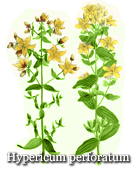St. John's wort anxiety and depression

Old Greeks and Romans believed that St. John’s wort can drive away demons. Today, St. John’s wort is famous as natural medicine against depressions. It is more abstemious alternative medicine with less contraindication.
Common St. John’s wort (Klamath weed) is shrubby herb with light yellow flowers is planted all over the world. It blooms from June to August. Because it blooms around St. John’s day (24.6.), it is sometimes called “St. John’s flowers”. It was used to calm nerves, and to heal lesion and burns. Dietary supplements are produced out of dried flowers containing remedial substances, especially healing pigment and chemic combinations of hyperforine.
Most frequent utilization of St. John’s wort
St. John’s wort cures melancholic depressions; helps to fight against bacteria and virus infections. St: John’s wort might help in therapy of premenstrual syndrome, fatigue, fibromyalgia, and helps to calm chronic pain or reduce weight.
St. John’s wort- treatment and effects
St. John’s wort is generally used to eliminate dysphoria and tension. Physicians are still not sure how it effects, but it is supposed, this herb increases the level of minimally four transmitters in brain; especially serotonin.
St. John’s wort and its main beneficial effects: 23 separate scientific researches agreed, St. John’s wort has the same effects as recent antidepressants, and is more effective than placebo to cure melancholia, anxiety and stress. St. John’s wort might help patients suffering from pathological emotions caused by melancholic depressions, for example anxiety, premenstrual syndrome, chronic fatigue, fibromyalgia, and some chronic pain. It was found, this plant might relief from pain. St. John’s wort helps people to have deep and sufficient sleep, to positively affect fatigue, sleepiness and energy deficiency. It is prosperous for “winter” melancholia and stress beginning in autumn and winter, and disappearing with sunny weather in spring. Some people are afraid of using present antidepressant for their contraindications; especially lowering sex drive. St. John’s wort has fewer side effects than such medicaments. In addition, it is well-taken together with other medicine used by patients for a long time.
American national institute maintain special research about St. John’s wort to discover all its beneficial effects.
St. John’s wort and its other effects: St. John’s wort has anti-bacterial and anti-virus effect. The research has showed, St. John’s wort could be the essential remedy to cure herpes (herpes simplex), influenza, and the EB virus (causes mononucleosis). Explorative study indicates, fundamental effects of this herb might be revolutionary in the therapy of AIDS. Using St. John’s wort cream to treat piles, it calms the itching and burning. St. John’s wort might be helpful in reducing weight.
How to use St. John’s wort
St. John’s wort and the dosage:
Recommended dosage is 300 mg of the extract containing 0,3 % hypericine three times per day. Dietary supplements containing 900 mg of this extract are also available in stores. These should be used once per day.
St. John’s wort should be used during meal to lower the risk of stomachache. In the past, people using St. John’s wort were recommended not to consume red wine or cheese. However, new studies had shown, this kind of food do not represent any harm while using St. John’s wort. Similar to prescribed antidepressants, St. John’s wort must reached certain level in organism tissues to evidence its positive effects. Therefore, any effects are adjudicated after four weeks at least. Consult using antidepressants together with St. John’s wort with your physician. Any side effects appear unlikely, however the doctor must know what exactly the patient use. Pregnant and nursing women did not evidence any contraindications after using St. John’s wort. However, they should be careful.
St. John’s wort – facts and advices
- In Germany, St. John’s wort is commonly prescribed by physicians as antidepressant. Often, it is more popular than foe example Prozac or Zoloft.
- In one recent study, 50 patients used either St. John’s wort or placebo. After eight weeks, 70 % of patients using St. John’s wort and only 45 % patients using placebo declared improvement. There were no side effects evidenced.
- St. John’s wort is only prescribed to patients suffering from light melancholia until the research shows sufficient effectiveness to patients with more serious kinds of melancholic depressions.
St. John’s wort – contraindications
The possibility of contraindications caused by St. John’s wort is very unlikely. There might appear retention, stomach sickness, or dizziness. People with light skin should avoid sun light.
Notifications about St. John’s wort
Patients who use classic antidepressants should consult using also St. John’s wort with their physician. If any allergic reaction appears, headache or breathing difficulties find doctor’s help and stop using St. John’s wort immediately.
St. John’s wort – Additional information
St. John’s wort is effective in capsules, tablets or as soft gel.